Abstract
Headspace volatiles from eight strains of Aspergillus flavus (four aflatoxigenic strains and four nonaflatoxigenic strains), grown for 1, 2, 3, 4, 8, and 10 days in submerged cultures, were collected in Tenax GC traps. The traps were desorbed onto a 50-m gas-liquid chromatography capillary column by heat and gas purge from an external direct injector device. The column was interfaced with a mass spectrometer data acquisition system. Peaks were identified by comparing retention times and mass spectra with those obtained from authentic compounds and by using a computer-assisted mass spectral data base. Aflatoxigenic strains of A. flavus produced several C15H24 compounds (e.g., alpha-gurjunene, trans-caryophyllene, and cadinene) which peaked in 3-day cultures and were not present in earlier (1- and 2-day) or later (8- and 10-day) cultures. None of these volatiles were detected in nonaflatoxigenic strains of A. flavus. There was an apparent correlation between the release of C15H24 volatile compounds and the initiation of aflatoxin biosynthesis, and a correlation between decline of aflatoxin synthesis and the disappearance of the C15H24 compounds unique to aflatoxigenic A. flavus also existed.
Full text
PDF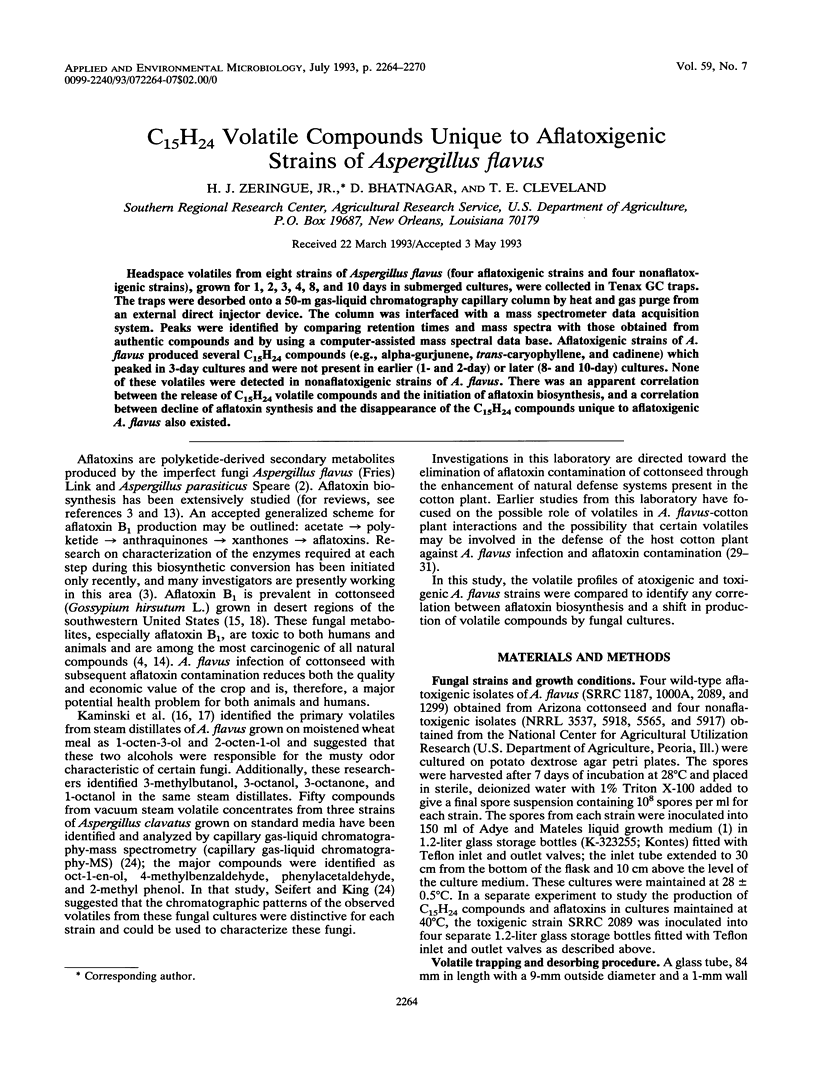
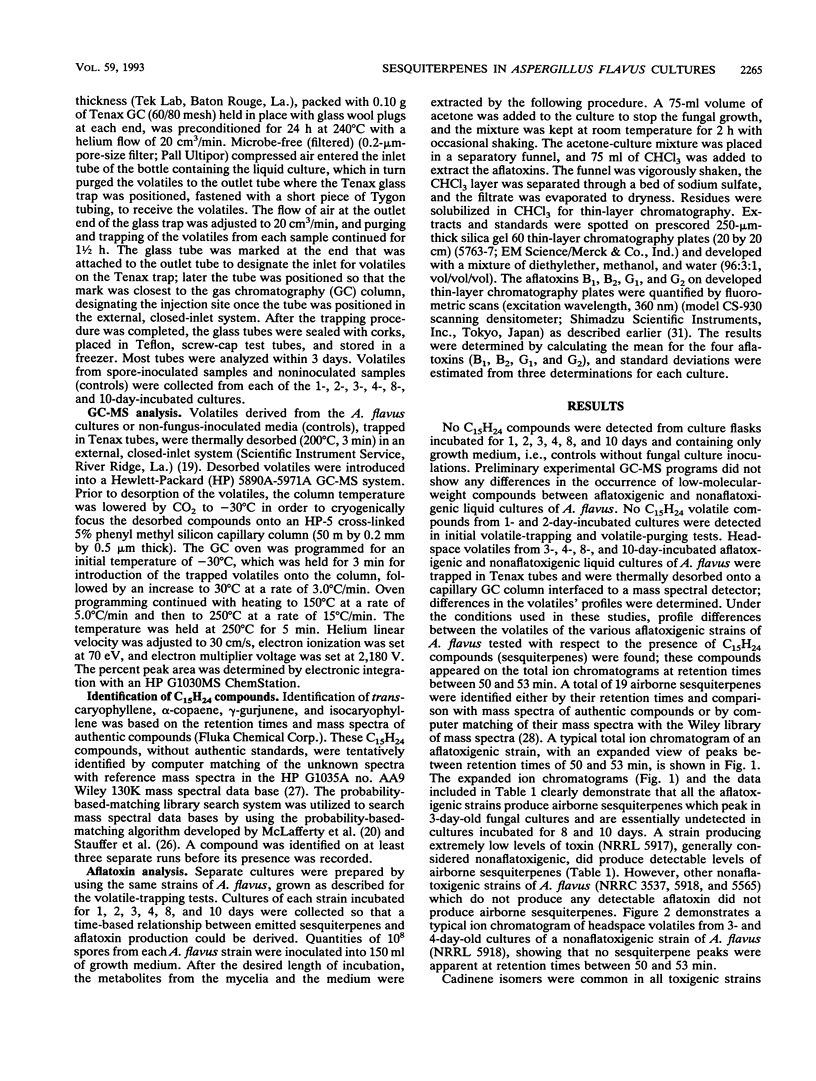
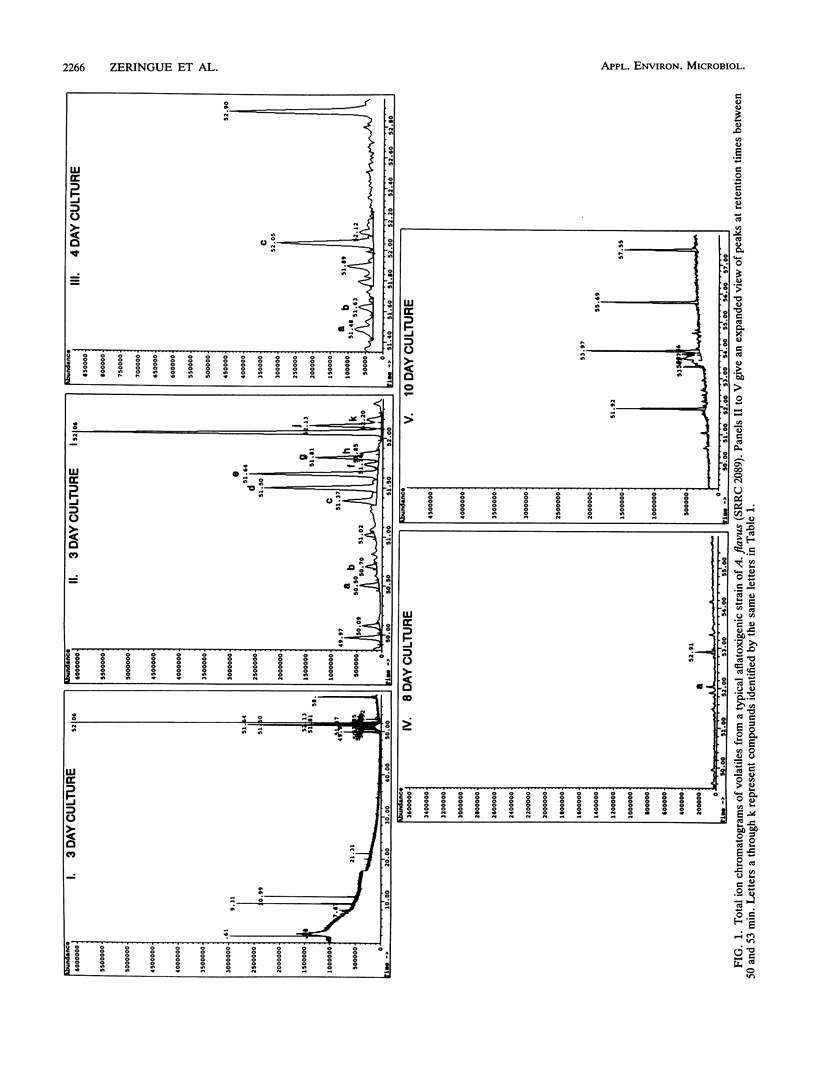
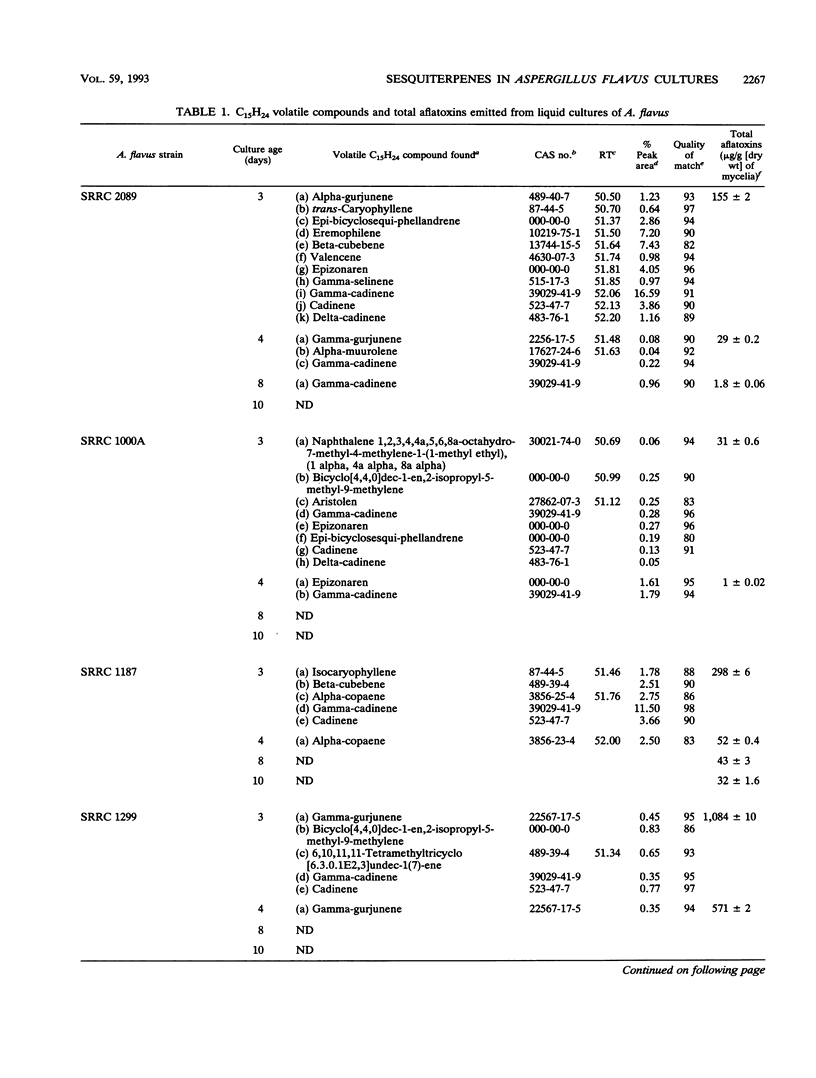
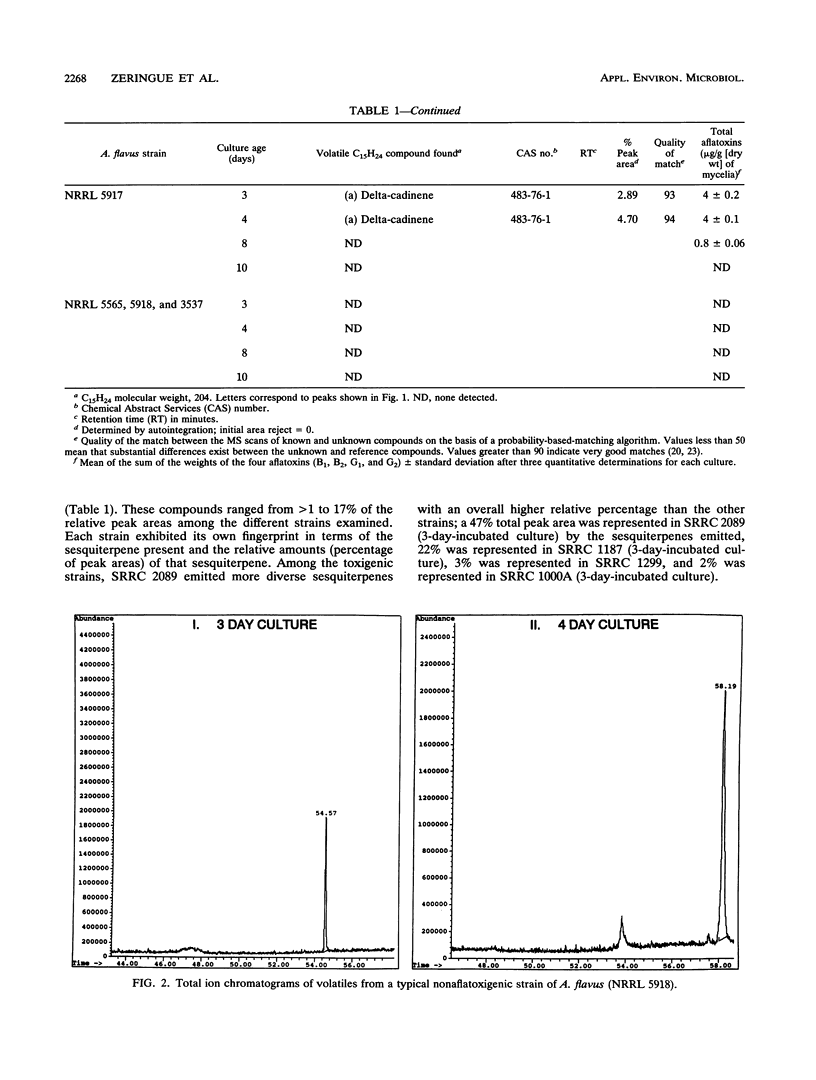
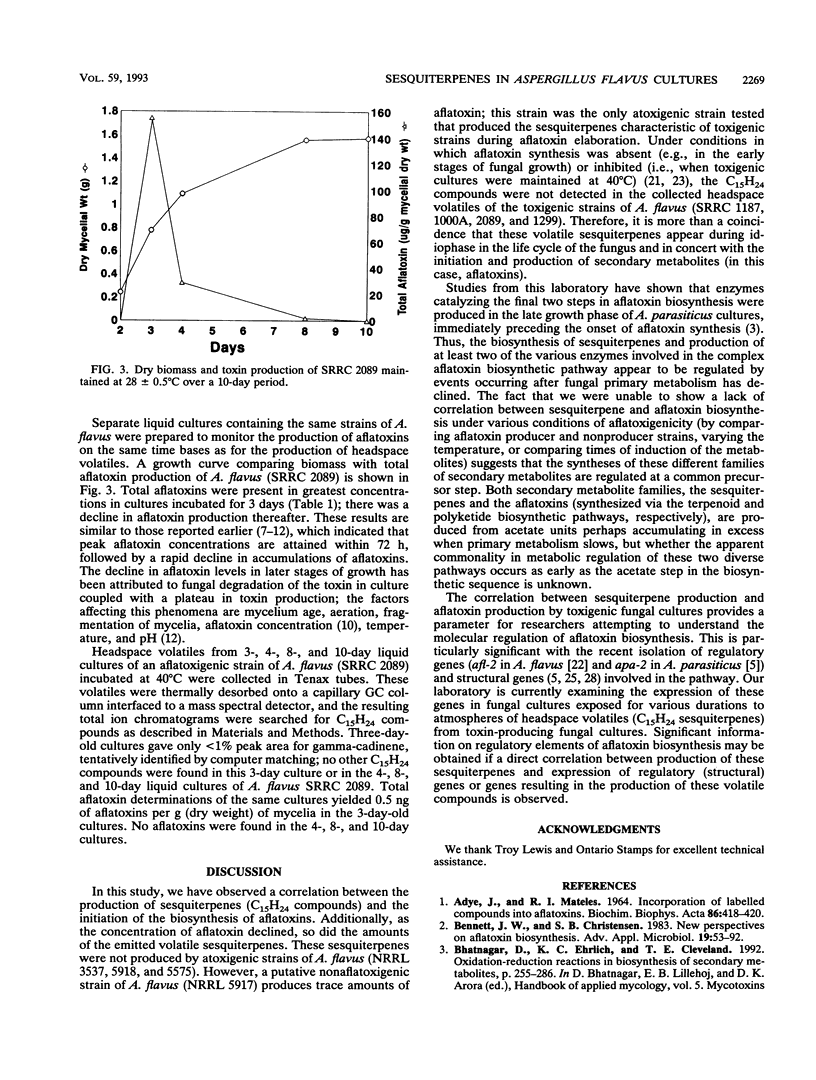
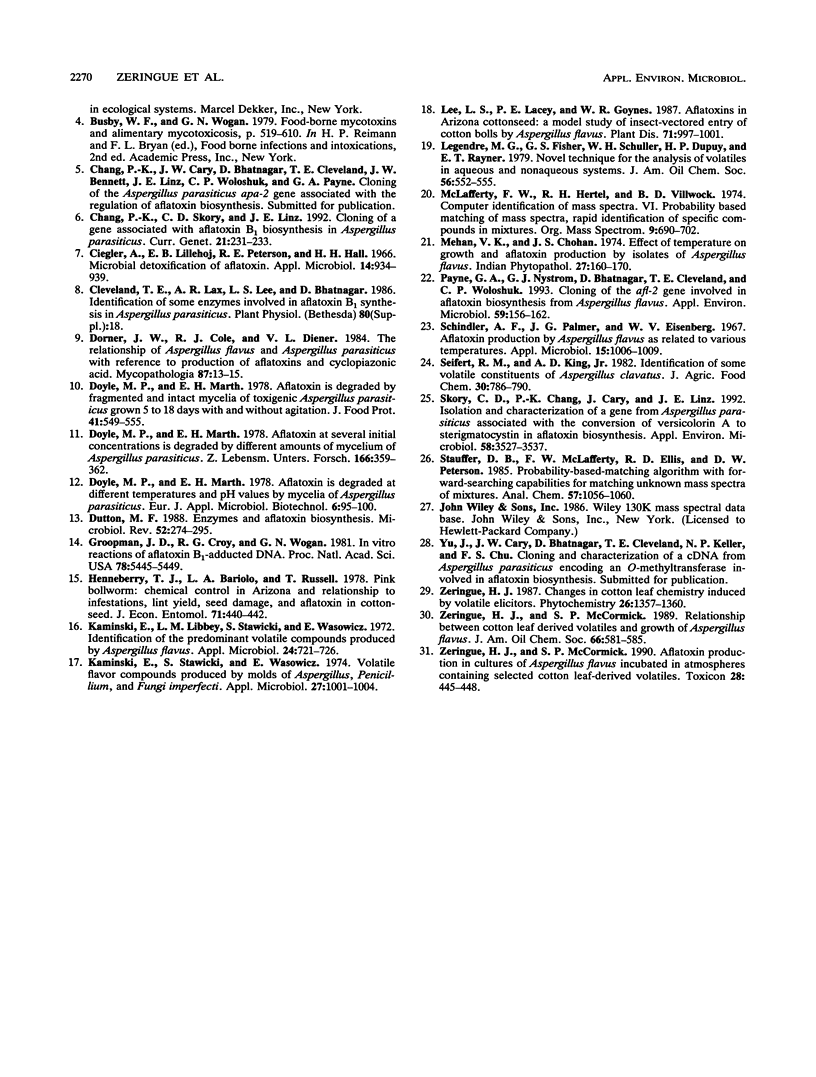
Selected References
These references are in PubMed. This may not be the complete list of references from this article.
- ADYE J., MATELES R. I. INCORPORATION OF LABELLED COMPOUNDS INTO AFLATOXINS. Biochim Biophys Acta. 1964 May 11;86:418–420. doi: 10.1016/0304-4165(64)90077-7. [DOI] [PubMed] [Google Scholar]
- Bennett J. W., Christensen S. B. New perspectives on aflatoxin biosynthesis. Adv Appl Microbiol. 1983;29:53–92. doi: 10.1016/s0065-2164(08)70354-x. [DOI] [PubMed] [Google Scholar]
- Chang P. K., Skory C. D., Linz J. E. Cloning of a gene associated with aflatoxin B1 biosynthesis in Aspergillus parasiticus. Curr Genet. 1992 Mar;21(3):231–233. doi: 10.1007/BF00336846. [DOI] [PubMed] [Google Scholar]
- Ciegler A., Lillehoj E. B., Peterson R. E., Hall H. H. Microbial detoxification of aflatoxin. Appl Microbiol. 1966 Nov;14(6):934–939. doi: 10.1128/am.14.6.934-939.1966. [DOI] [PMC free article] [PubMed] [Google Scholar]
- Dorner J. W., Cole R. J., Diener U. L. The relationship of Aspergillus flavus and Aspergillus parasiticus with reference to production of aflatoxins and cyclopiazonic acid. Mycopathologia. 1984 Aug 30;87(1-2):13–15. doi: 10.1007/BF00436617. [DOI] [PubMed] [Google Scholar]
- Doyle M. P., Marth E. H. Aflatoxin at several initial concentrations is degraded by different amounts of mycelium of Aspergillus parasiticus. Z Lebensm Unters Forsch. 1978 Jul 31;166(6):359–362. doi: 10.1007/BF01181506. [DOI] [PubMed] [Google Scholar]
- Dutton M. F. Enzymes and aflatoxin biosynthesis. Microbiol Rev. 1988 Jun;52(2):274–295. doi: 10.1128/mr.52.2.274-295.1988. [DOI] [PMC free article] [PubMed] [Google Scholar]
- Groopman J. D., Croy R. G., Wogan G. N. In vitro reactions of aflatoxin B1-adducted DNA. Proc Natl Acad Sci U S A. 1981 Sep;78(9):5445–5449. doi: 10.1073/pnas.78.9.5445. [DOI] [PMC free article] [PubMed] [Google Scholar]
- Kaminski E., Stawicki S., Wasowicz E. Volatile Flavor Compounds Produced by Molds of Aspergillus, Penicillium, and Fungi imperfecti. Appl Microbiol. 1974 Jun;27(6):1001–1004. doi: 10.1128/am.27.6.1001-1004.1974. [DOI] [PMC free article] [PubMed] [Google Scholar]
- Kamiński E., Libbey L. M., Stawicki S., Wasowicz E. Identification of the predominant volatile compounds produced by Aspergillus flavus. Appl Microbiol. 1972 Nov;24(5):721–726. doi: 10.1128/am.24.5.721-726.1972. [DOI] [PMC free article] [PubMed] [Google Scholar]
- Payne G. A., Nystrom G. J., Bhatnagar D., Cleveland T. E., Woloshuk C. P. Cloning of the afl-2 gene involved in aflatoxin biosynthesis from Aspergillus flavus. Appl Environ Microbiol. 1993 Jan;59(1):156–162. doi: 10.1128/aem.59.1.156-162.1993. [DOI] [PMC free article] [PubMed] [Google Scholar]
- Schindler A. F., Palmer J. G., Eisenberg W. V. Aflatoxin Production by Aspergillus flavus as Related to Various Temperatures. Appl Microbiol. 1967 Sep;15(5):1006–1009. doi: 10.1128/am.15.5.1006-1009.1967. [DOI] [PMC free article] [PubMed] [Google Scholar]
- Skory C. D., Chang P. K., Cary J., Linz J. E. Isolation and characterization of a gene from Aspergillus parasiticus associated with the conversion of versicolorin A to sterigmatocystin in aflatoxin biosynthesis. Appl Environ Microbiol. 1992 Nov;58(11):3527–3537. doi: 10.1128/aem.58.11.3527-3537.1992. [DOI] [PMC free article] [PubMed] [Google Scholar]
- Zeringue H. J., Jr, McCormick S. P. Aflatoxin production in cultures of Aspergillus flavus incubated in atmospheres containing selected cotton leaf-derived volatiles. Toxicon. 1990;28(4):445–448. doi: 10.1016/0041-0101(90)90083-j. [DOI] [PubMed] [Google Scholar]


